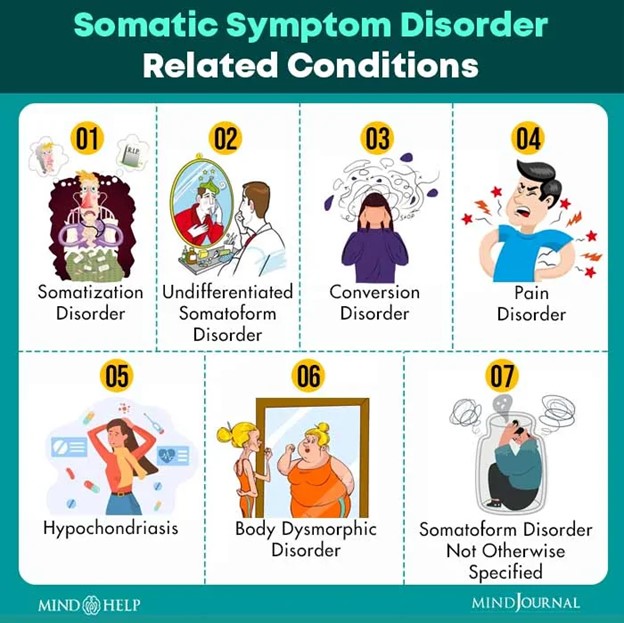Types of somatic symptom illnesses
The types of somatic symptom illnesses include:
- Somatic symptom disorder: The person has one or more chronic physical symptoms that are distressing or interfere with daily life, and has excessive or maladaptive responses to the symptoms or their health concerns.
- Illness anxiety disorder: The person has a preoccupation with having or acquiring a serious illness, despite having no or minimal somatic symptoms, and has excessive health-related behaviors or avoidance.
- Conversion disorder (functional neurological symptom disorder): The person has one or more symptoms of altered voluntary motor or sensory function that are incompatible with neurological or medical conditions, and cause significant distress or impairment.
- Factitious disorder: The person intentionally produces or falsifies physical or psychological symptoms or signs, without any external rewards, in order to assume the sick role.
- Other specified somatic symptoms and related disorders: The person has somatic symptoms that cause clinically significant distress or impairment but do not meet the full criteria for any of the specific disorders.
- Unspecified somatic symptom and related disorder: The person has somatic symptoms that cause clinically significant distress or impairment but the clinician chooses not to specify the reason for not meeting the full criteria for any of the specific disorders.
|
Aspect |
Somatic Symptom Disorder |
Factitious Disorder |
Conversion Disorder |
Illness Anxiety Disorder |
|
Nature of Symptoms |
Physical symptoms with no apparent medical cause. |
Faking, exaggerating, or inducing symptoms for attention or care. |
Neurological symptoms affecting voluntary motor or sensory functions. |
Persistent fear or belief of having a serious illness despite minimal or no symptoms. |
|
Awareness of Symptoms |
The individual is genuinely distressed and concerned about symptoms. |
The individual is consciously aware of fabricating or inducing symptoms. |
The individual is unaware of the psychological origins of symptoms. |
The individual is aware of their anxiety, but it is focused on illness. |
|
Motivation |
Symptoms are not intentionally produced and cause significant distress. |
Motivated by attention, sympathy, or to assume a "sick role." |
Symptoms are a psychological response to stress, often providing a way to avoid distressing situations. |
Preoccupation with having a serious illness despite reassurance and medical evaluations. |
|
Primary Gain |
Emotional relief gained from focusing on physical symptoms. |
Attention and care from others due to assumed illness. |
Temporary reduction of anxiety or escape from stressful situations. |
Reassurance and medical tests temporarily alleviate anxiety. |
|
Secondary Gain |
Social support and attention received due to symptoms. |
Increased attention, avoidance of responsibilities, and sympathy. |
Attention and care from others; may escape from undesirable situations. |
Reassurance from medical professionals and temporary relief from anxiety. |
|
Diagnostic Criteria |
Experiencing distressing physical symptoms along with excessive thoughts, feelings, or behaviors related to symptoms. |
Intentional production or falsification of physical or psychological symptoms; motivation for external gain. |
Neurological symptoms that cannot be explained by a medical condition; significant distress or impairment. |
Preoccupation with having a serious illness, excessive health-related behaviors, and minimal or no somatic symptoms. |
|
Treatment Approach |
Cognitive-behavioral therapy, addresses underlying emotional factors, and managing symptoms. |
Addressing underlying psychological issues through therapy and addressing the motivation for symptom fabrication. |
Focusing on addressing underlying stressors and providing supportive therapy. |
Cognitive-behavioral therapy, reassurance, and addressing anxiety-related thought patterns. |
|
Prognosis |
Variable; improvement with appropriate therapy and support. |
Challenging; requires addressing complex psychological motivations. |
Often improves with time and treatment of underlying stressors. |
Can improve with therapy, but may fluctuate based on anxiety levels. |

Nursing Test Bank
Naxlex Comprehensive Predictor Exams
Questions on Types of somatic symptom illnesses
Correct Answer is C
Explanation
Correct Answer is C
Explanation
Correct Answer is A
Explanation
Correct Answer is C
Explanation
Correct Answer is B
Explanation
Correct Answer is C
Explanation
Correct Answer is B
Explanation
Correct Answer is ["A","C","E"]
Explanation
Correct Answer is ["B","C","E"]
Explanation
Correct Answer is C
Explanation
Correct Answer is A
Explanation
Correct Answer is D
Explanation
Correct Answer is C
Explanation
Correct Answer is D
Explanation
Correct Answer is C
Explanation
Search Here
Related Topics
- Types of Eating Disorders DSM 5 - Somatic Symptom Illnesses and Sleep/Wakefulness Disorders
- Obsessive-compulsive disorders - Somatic Symptom Illnesses and Sleep/Wakefulness Disorders
- Clinical Picture of Abuse and Violence - Somatic Symptom Illnesses and Sleep/Wakefulness Disorders
- Child and Elder Abuse - Somatic Symptom Illnesses and Sleep/Wakefulness Disorders
- Child Abuse - Somatic Symptom Illnesses and Sleep/Wakefulness Disorders
- Elder Abuse - Somatic Symptom Illnesses and Sleep/Wakefulness Disorders
More on Nursing
Free Nursing Study Materials
Access to all study guides and practice questions for nursing for free.
- Free Nursing Study Trials
- Free Nursing Video tutorials
- Free Nursing Practice Tests
- Free Exam and Study Modes
- Free Nursing Revision Quizlets
